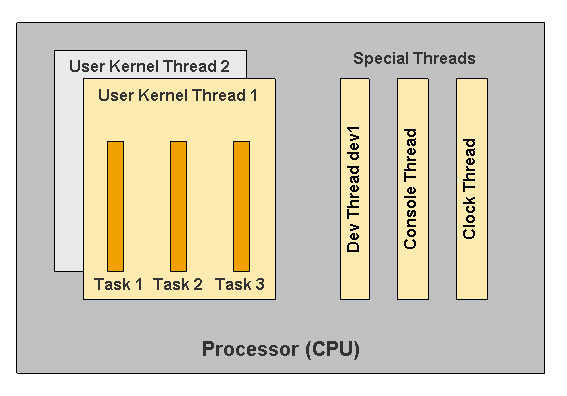 Threads
Threads 
A process consists of one or more threads in which the application is executed. The database generates threads for those tasks that the system is to execute in parallel. A thread is the unit to which the operating system assigns processor time.
Note that on Linux systems without NPTL (Native Posix Thread Library), each thread is simulated by a clone process.

Threads of a Database
The database system differentiates between two types of threads:
User Kernel Threads (UKT)
UKTs process client requests. They are the threads that use the most processor time. A database generally has several UKTs.
In general, several tasks share a UKT. The database system controls the sequence in which the tasks run in a UKT, and can therefore avoid conflicts in accessing resources.
More information: Task Switching
To distribute tasks optimally to the UKTs, the database system performs internal load balancing between the user kernel threads.
More information: Load Balancing Between User Kernel Threads
Special Threads
Special threads provide services for the user kernel threads. In special threads, the database system executes tasks whose duration cannot be predicted, such as operating system calls for reading and writing to volumes and connection requests from clients. The database system processes special threads asynchronously to the user kernel threads.
Special Threads Name
Description
Coordinator
The Coordinator thread monitors all threads in the database. It is the first thread that the database system creates when the database is started. It coordinates the start processes of the other threads. If an error occurs, the Coordinator thread can stop other threads.
Requester
The Requester thread accepts user logons to the database and assigns them to a user task within a user kernel thread.
Console
The Console thread processes the requests of the XCONS database tool (database console).
Clock
Only on Microsoft Windows
The Clock thread sets a global time variable with which internal time measurements are aligned.
dev<n>
Dev Threads are responsible for carrying out write and read requests of the tasks in the volumes.
The Dev threads are numbered sequentially (dev<n>). The Dev thread dev0 plays a special role here. It coordinates and monitors the other Dev threads.
The number of Dev threads is primarily dependent on the number of volumes in the database. The database system activates two Dev threads for each data volume and each log volume. If the database trace is on, the database system activates a Dev thread for it as well.
asdev<i>
To perform data backups, the database system activates temporary Dev threads asdev<i> for reading and writing the data.
Timer
Timer threads are responsible for monitoring the time for time-outs, for internal load balancing and for other time-dependent internal controls.
Worker
The Worker thread is responsible for reporting completed asynchronous I/O operations.
To display information about threads, use Database Studio, Database Manager CLI or CCMS (in SAP systems only). More information:
Database Studio, Displaying Threads
Database Manager CLI, show
Database Administration in CCMS, Kernel Threads